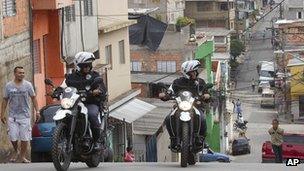Brazil: 13 new deaths in Sao Paulo's gang battle
- Published

At least 13 people have died in fresh violence between police and a gang in Brazil's largest city, Sao Paulo.
More than 130 people have died in the last two weeks as part of a conflict between the police and the gang, known as First Command of the Capital (PCC).
Many attacks on officers are believed to be arranged from inside prison by jailed gang members.
BBC Brasil has seen a document by a group of prosecutors calling for PCC leaders to be moved to other jails.
They say Sao Paulo's prison system does not have the capacity to isolate such dangerous inmates and they should be transferred to federal prisons.
But the issue is a sensitive one, correspondents say.
The last time they tried to move jailed gang leaders, in 2006, the PCC unleashed a wave of violence and riots that led to the deaths of almost 500 people.
Orders from jail
Some of Sao Paulo's poorer districts have remained shut and businesses have been closing early as the conflict between police and the PCC has escalated. Buses have also been burned and transport disrupted.
In the latest violence, nine people were killed in a five-hour period on Thursday evening, the BBC's Gary Duffy reports from Sao Paulo.
A senior law officer told the BBC he believes civilians are being killed in revenge attacks by some police officers.
More than 90 officers have been killed in the city since the beginning of the year.
Earlier in the week, the authorities unveiled plans to tackle the situation.
They included creating a new police agency and stepping up security and surveillance at ports, airports and highways, which are used to smuggle drugs into the city.
Sao Paulo Governor Geraldo Alckmin said inmates suspected of ordering attacks on police officers would be moved to maximum security prisons under federal control, from where they would be unable to communicate with their hit men.
The authorities believe that, even in prison, the gang leaders are capable of controlling members, issuing orders by mobile phones and directing the sale of drugs, purchase of arms, and murders of both rival gang members and security officials.
The man regarded as the PCC leader, Marcos Herbas Camacho, also known as Marcola, and a dozen criminals who make up the rest of the gang's command structure are currently held in jails in Sao Paulo state.
The authorities moved one prisoner, from the lower level of the PCC leadership, to a jail in the north of Brazil on Thursday, and another 18 members of the gang are expected to be transferred to other jails in November.
But the prosecutors, in their letter, argued that only with the transfer of Marcola and the second tier of the leadership to jails outside of Sao Paulo can the powerful criminal faction be taken apart.
The authorities are thought to be uneasy about accepting such advice for fear of provoking an escalation in violence, our correspondent reports.
- Published18 October 2012
- Published3 October 2012
- Published12 June 2012